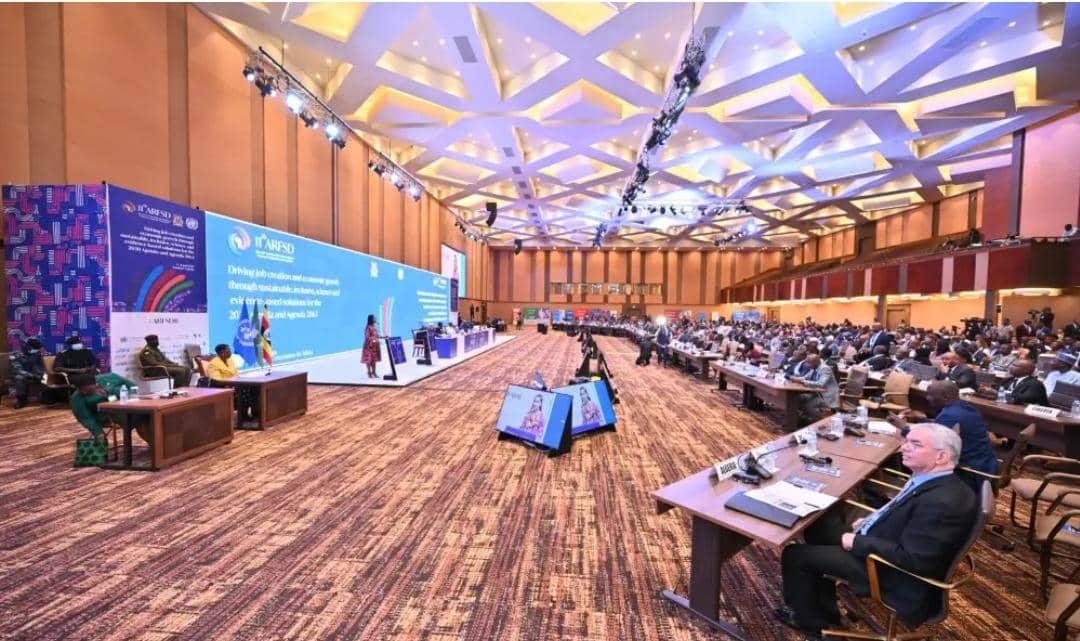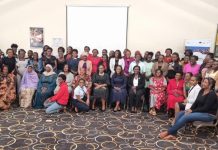Africa-Press – Uganda. As climate change continues to reshape Africa’s economic landscape, experts at a high-level side event during the Eleventh Session of the Africa Regional Forum on Sustainable Development (ARFSD) delivered a stark message, the continent’s workforce is at a crossroads, and a just, inclusive transition is no longer optional it’s urgent.
The event, spearheaded by the UN Economic Commission for Africa (UNECA) through its Macroeconomic Policy, Finance and Governance Division, unpacked key insights from the Economic Report on Africa 2023 and 2024, spotlighting the climate crisis as both a disruptor and a catalyst for transformation.
“Africa’s labour market is walking a tightrope, with 83% of employment still informal and concentrated in vulnerable sectors like agriculture, construction, and services, millions especially women and youth face escalating risks of job and income losses, ”said Ms. Nadia Ouedraogo, Economic Affairs Officer at UNECA.
Moderating the panel, Ms. Zuzana Schwidrowski, Director of the Division, emphasized the far-reaching impact of climate shocks, from slowed economic growth to fiscal depletion and weakened financial systems. Yet, she remained cautiously optimistic.
“While the impacts are devastating, climate change also presents opportunities for innovation, structural transformation, and sustainable growth that Africa must seize, “Zuzana noted.
Ugandan official Dr. Sam Mugume Koojo(PhD) Assistant Commissioner at the Ministry of Finance, called for stronger public-private synergy to anchor Africa’s green transition.
“We must prioritize climate action and invest in a just transition that promotes decent jobs and inclusive growth, we should emphasize the need for co-creation and knowledge-sharing to address Africa’s complex workforce challenges.” Mugume urged.
The conversation was steeped in data and foresight,Mr. Andrew Mundalo Allieu, Senior Economist at the ILO Regional Office for Africa, warned that 1.2 billion workers worldwide depend on ecosystems for their livelihoods, making them directly vulnerable to environmental degradation.
“We are already losing 2.3% of global working hours to heat stress,and that could wipe out 14 million jobs by 2030 if no action is taken.”Andrew stated.
World Bank Senior Climate Economist Mr. Etienne Espagne underscored the need for regional coordination and skills alignment to tap into climate-resilient job sectors.
“As climate change disrupts yields and alters commodity values, aligning supply chains with regional strengths will be crucial. Falling renewable energy costs are promising, but uncertainty remains. Early and coordinated investments are essential,” Espagne noted.
Ms. Olapeju Ibekwe, CEO of the Sterling One Foundation, pushed for gender equity and green finance to be embedded in the transition.
“A green Africa must be an inclusive Africa,” she said.
“Women must have equal access to skills, capital, and leadership in this new economy.” Olapeju noted.
Panelists painted a sobering picture of the cost of inaction. A mere 1°C temperature rise could shrink Africa’s GDP by 2.2% by 2030, with West Africa expected to bear the heaviest burden. Climate-linked conflict, migration, and market instability are already compounding employment vulnerabilities.
Still, there is hope, the transition to green economies, while likely to displace fossil fuel jobs in regions like West and Central Africa, is also projected to unlock massive job opportunities.
Experts cited the carbon market alone could generate up to 400 million jobs by 2050, with additional gains in renewable energy and sustainable agriculture.
To navigate this shift equitably, panelists called for bold, targeted action across four key fronts,including, Investing in reskilling and upskilling, especially for youth and informal workers, Innovative financing for green projects, Expanding social protection systems to shield vulnerable communities and Cross-border knowledge-sharing and policy alignment.
“Africa’s workforce doesn’t need to be a casualty of climate change,it can be our greatest engine for green, inclusive growth if we act now.” one panelist concluded.
A unified call to turn climate risks into momentum for sustainable employment and resilient economic systems across the continent was made.
For More News And Analysis About Uganda Follow Africa-Press






